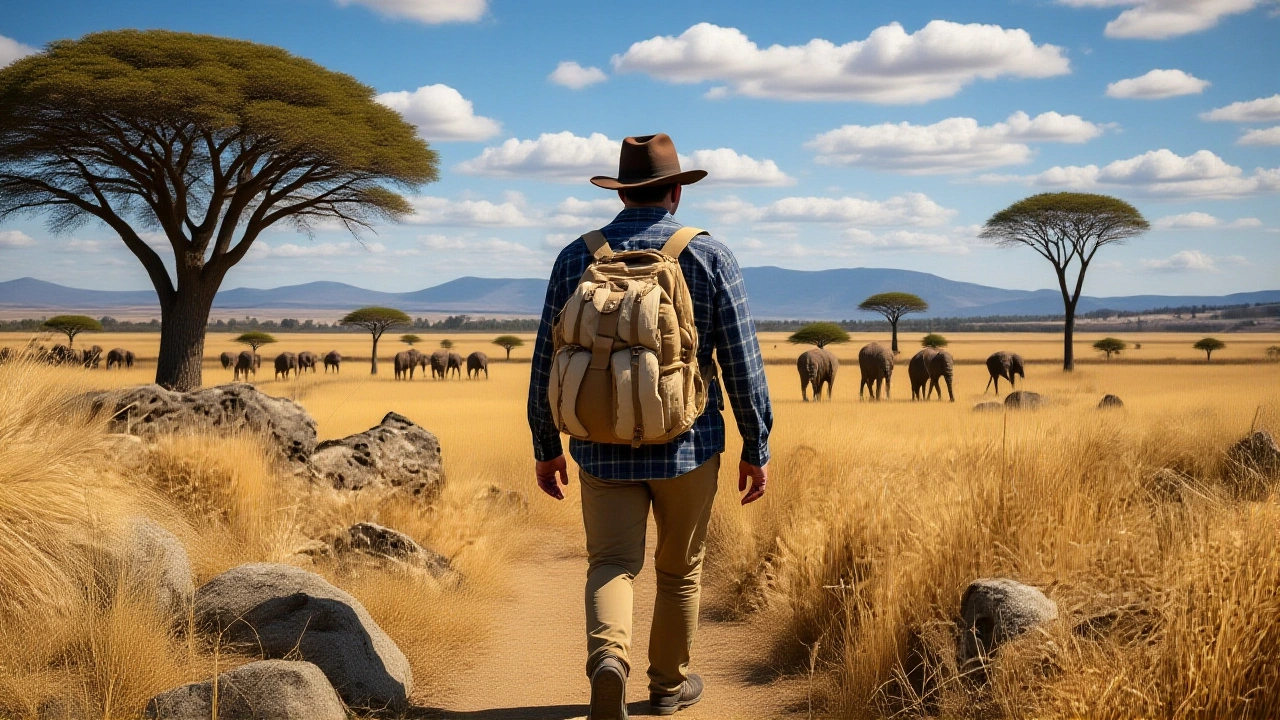When Jamal Younes Kilito, country manager for India at the Moroccan National Tourism Office, announced a 43% jump in Indian arrivals, the continent’s tourism boom was already in full swing. A few weeks later, Hossam Hazaa of the Egyptian Federation of Tourism Chambers declared Egypt the "most variable tourism destination worldwide in 2025," underscoring how rapidly the market is shifting.
What began as a post‑pandemic rebound has transformed into a tourism boom that sees Egypt, Morocco, Mauritius, Tunisia, Namibia, Seychelles, Ghana and Zambia all posting double‑digit growth rates for 2024‑2025. According to the Travel and Tour World 2025 report, Morocco recorded 17.4 million visitors in 2024—a 20% rise over the previous year—leap‑frogging Egypt’s 15.7 million arrivals and claiming the title of Africa’s top destination.
Tourism Numbers Soar Across North Africa
Morocco’s surge is not a flash in the pan. Visitor numbers have climbed 33% above the 2019 pre‑pandemic baseline, a feat driven by aggressive market diversification and a laser focus on India, China and the Gulf. In India alone, the country welcomed 41,000 passport holders in 2024, up from 28,700 the year before. Egypt is keeping pace, with arrivals rising 15% year‑on‑year, bolstered by high‑spending tourists from Saudi Arabia, the UAE and a growing cohort of European heritage travellers.
East and Southern African markets are also adding fuel to the fire. Kenya, South Africa, and Zimbabwe have reported record safaris, while the Indian Ocean islands of Mauritius and Seychelles have seen luxury‑focused cruise passengers double their spend per night.
What’s Driving the Surge?
Three forces converge to explain the upturn: infrastructure upgrades, digital innovation and targeted marketing campaigns. The World Economic Forum’s Travel and Tourism Development Index lifted Egypt 22 places to 61st in 2024, reflecting massive investments in airport capacity, high‑speed rail links and upgraded coastal resorts.
Digital platforms are reshaping the visitor experience. A new Egyptian online portal now trims yacht‑visa processing from weeks to a mere 30 minutes, while extending permitted stays from a fortnight to three months. Lucien Klat, an entrepreneur pioneering the revival of the traditional dahabeya—shallow‑bottomed Nile sailing boats—has turned heritage vessels into high‑end floating hotels. His flagship, Sekhmet, launched in 2022, now hosts up to 30 luxury guests per night, blending history with modern comfort.
Egypt’s Strategic Push
Egypt’s government has rolled out a suite of campaigns aimed at different source markets. The "Living 365" initiative, launched in 2024, targets Gulf and Arab states, encouraging longer stays through bundled cultural tours and desert‑camp experiences. Earlier, the 2022 "Follow the Sun" campaign reached half a billion eyes worldwide, emphasizing Egypt’s year‑round sunshine and diverse landscapes—from the Red Sea reefs to the Siwa Oasis.
Visa policy changes also play a pivotal role. In a landmark move, Egypt’s embassy in Rabat announced a visa‑on‑arrival scheme for Moroccan citizens, slashing paperwork and signaling a diplomatic push to deepen bilateral tourism flows.
Marketing-wise, Egypt participated in 33 international tourism fairs between 2023 and 2024 and organized 80 influencer‑led familiarisation trips, driving a measurable surge in social‑media mentions and search queries for Egyptian destinations.
Morocco’s Market Moves
Meanwhile, Morocco has concentrated on diversifying its visitor base beyond traditional European markets. The Moroccan National Tourism Office, under Kilito’s leadership, has opened new offices in Mumbai and Bangalore, offering tailored itineraries that showcase Morocco’s UNESCO‑listed medinas, desert‑star gazing experiences and emerging wine‑tourism routes in the Atlas foothills.
Infrastructure upgrades—such as the high‑speed TGV link between Casablanca and Marrakesh—have cut travel times dramatically, making multi‑city trips more feasible for short‑stay tourists. The government also introduced a new “digital nomad visa” that allows remote workers to stay for up to a year, a move that aligns with the global rise of work‑from‑anywhere lifestyles.

Implications for the Continent
The collective growth of these African destinations challenges the outdated perception of the continent as a single‑destination market. Instead, travelers now view Africa as a mosaic of experiences—each country offering a distinct story, whether it’s the Nile’s ancient allure, Morocco’s Moorish architecture, or Zambia’s Victoria Falls mist.
Economically, the tourism boom is generating jobs at every level—from high‑end yacht captains to local market vendors. The International Labour Organization estimates that each 1% rise in tourist arrivals can create up to 15,000 new jobs across the region, a critical factor for economies still recovering from COVID‑19 disruptions.
Environmentalists, however, warn that unchecked growth could strain fragile ecosystems, especially in coastal and desert areas. Both Egypt and Morocco have pledged to adopt greener certifications for hotels and to expand protected marine zones, signalling an awareness that sustainable tourism must accompany expansion.
What’s Next?
Looking ahead to 2025, industry insiders expect the momentum to hold, with the World Travel & Tourism Council projecting a 7% global increase in international arrivals. For Africa, the focus will likely sharpen on seamless digital entry systems, climate‑smart infrastructure, and curated cultural trails that keep visitors engaged beyond the first week of their trip.
Travel agents and tour operators are already re‑packaging itineraries to offer cross‑border experiences—imagine a week in Cairo, followed by a desert trek in Morocco, and a safari finale in Zambia. If demand continues on this trajectory, the continent could well become the world’s next tourism heavyweight.
Frequently Asked Questions
How does the tourism boom affect local employment in Egypt and Morocco?
Both countries have seen a sharp rise in hospitality jobs, from hotel staff to tour guides. The International Labour Organization estimates that a 1% increase in arrivals creates roughly 15,000 jobs across the region, meaning the recent double‑digit growth could translate into tens of thousands of new positions by 2025.
What new visa policies have been introduced to boost tourism?
Egypt now offers visa‑on‑arrival for Moroccan citizens, simplifying entry for Gulf and Arab travelers as well. Morocco, meanwhile, launched a digital‑nomad visa that lets remote workers stay up to a year, attracting a new segment of long‑term visitors.
Which campaigns have driven the most visitor growth?
Egypt’s "Living 365" campaign targeted Gulf tourists with bundled stays, while the 2022 "Follow the Sun" campaign reached 500 million people worldwide, raising awareness of Egypt’s year‑round climate. Morocco’s focus on the Indian market, highlighted by Kilito’s outreach in Mumbai and Bangalore, delivered a 43% jump in Indian arrivals.
What environmental measures are being taken alongside growth?
Both governments are expanding green‑hotel certifications and enlarging marine protected areas. Egypt’s World Economic Forum ranking improvement reflects investments in sustainable infrastructure, while Morocco is piloting solar‑powered desert resorts to lessen the carbon footprint of tourism.
What can travelers expect from the new digital yacht platform?
The platform cuts visa processing from weeks to 30 minutes and extends allowed yacht stays from two weeks to three months, opening up opportunities for luxury cruising along the Red Sea and Mediterranean coasts without lengthy bureaucratic hurdles.

Naman Patidar
October 13, 2025 AT 22:54Tourism numbers look good on paper.
Anil Puri
October 14, 2025 AT 18:20Sure, the numbers look shiny, but who’s to say they’re real? The reports probably double‑counted the same tourists thier way. I bet they’re inflating them to get more money.
poornima khot
October 15, 2025 AT 11:00It’s heartening to see African destinations stepping into the global spotlight. The cultural tapestry of Egypt and Morocco offers travelers more than just sights – it offers stories that shape our collective human heritage. When we support sustainable tourism, we invest in preserving those narratives for future generations.
Mukesh Yadav
October 16, 2025 AT 03:40Don’t be fooled by the glossy brochures. Every surge comes with hidden agendas – think data mining, surveillance, and a push to turn our historic sites into playgrounds for the elite. The so‑called "boom" is just a distraction.
Halbandge Sandeep Devrao
October 16, 2025 AT 20:20From a macro‑economic perspective, the tourism surge serves as a catalyst for synergistic development across ancillary sectors. The elasticity of demand in high‑margin hospitality niches drives incremental revenue streams, thereby enhancing fiscal resilience. Moreover, the digitization of visa processes reduces transaction costs and optimizes throughput.
Thirupathi Reddy Ch
October 17, 2025 AT 13:00While the data looks promising, we must question the moral cost of rapid expansion. Over‑tourism can erode local values, and the narrative of progress often masks exploitation. A balanced approach is essential.
Sonia Arora
October 18, 2025 AT 05:40What a fantastic time to be a traveler in Africa! The diverse experiences-from the Nile’s timeless flow to Morocco’s bustling souks-ignite the soul. Let’s celebrate these moments while remembering to respect the lands we visit.
vinay viswkarma
October 18, 2025 AT 22:20The hype is overblown; numbers don’t equal quality.
sanjay sharma
October 19, 2025 AT 15:00For travelers seeking reliable information, the new Egyptian online portal cuts visa processing to 30 minutes, which is a game‑changer. It also extends stay limits, offering more flexibility for itinerary planning.
varun spike
October 20, 2025 AT 07:40Interesting data but could you provide sources for the employment figures The article mentions 15,000 jobs per percent increase but no citation there
Chandan Pal
October 21, 2025 AT 00:20Wow, the numbers are impressive! 😲🌍 Can't wait to see more tourists exploring the Sahara and the Red Sea. 🎉✈️
SIDDHARTH CHELLADURAI
October 21, 2025 AT 17:00Totally agree! The boost is great news for local economies 😊👍
Deepak Verma
October 22, 2025 AT 09:40Tourism brings jobs and money. The stats look correct.
Rani Muker
October 23, 2025 AT 02:20Do we have any data on how these increases affect local communities? It would be nice to see some grassroots perspectives.
Hansraj Surti
October 23, 2025 AT 19:00The meteoric rise of African tourism in 2025 is more than a statistical curiosity. It represents a tectonic shift in global travel paradigms. Scholars have long argued that destination branding can reconfigure economic trajectories, and the data from Egypt and Morocco now provide empirical vindication. The high‑speed rail corridor linking Casablanca to Marrakesh is a tangible manifestation of infrastructural foresight. Simultaneously, Egypt's digital visa platform exemplifies the convergence of bureaucratic efficiency and technological innovation. When one examines the multiplier effect on employment, the creation of fifteen thousand jobs per percent increase underscores a profound socioeconomic ripple. Yet, the environmental externalities cannot be dismissed; unchecked footfall threatens fragile desert and marine ecosystems. The policy pivot toward green hotel certifications signals a nascent but necessary correction. Moreover, the digital nomad visa scheme in Morocco challenges traditional notions of temporality in tourism. This policy not only diversifies the visitor profile but also injects sustained fiscal inflows. The cross‑border itinerary models, such as a week in Cairo followed by a trek in the Sahara, illustrate the maturation of integrated African tourism circuits. Industry analysts forecast a continuation of the 7 percent global arrival growth, positioning Africa as a heavyweight contender. Investors are therefore poised to recalibrate capital allocations toward hospitality infrastructure on the continent. In sum, the symbiosis of infrastructure, digitization, and strategic marketing creates a virtuous cycle. The onus now lies with policymakers to balance expansion with sustainability, lest the boom become a bust.
Vinay Bhushan
October 24, 2025 AT 11:40Great analysis! This optimism is exactly what the sector needs to keep moving forward.
Yogitha Priya
October 25, 2025 AT 04:20Seriously, all this hype makes me uncomfortable. We’re putting profit over people and the planet.
Rajesh kumar
October 25, 2025 AT 21:00Listen, the only way Africa can truly dominate the tourism market is by asserting its own narrative, free from Western gatekeepers. The current strategies are too timid; we need bold policies that prioritize our sovereignty and cultural integrity. By leveraging our unique assets-ancient heritage, diverse wildlife, and vibrant modern cities-we can create a brand that commands respect and high-value spending. This means investing heavily in security, infrastructure, and indigenous entrepreneurship, while refusing to bow to external pressure for low‑cost mass tourism. We must also enforce strict environmental standards to protect our ecosystems, because a depleted landscape is no longer a selling point. In short, aggressive national pride combined with strategic, sustainable development will turn the current surge into a lasting legacy, not a fleeting fad.